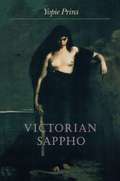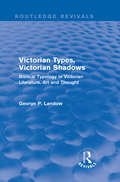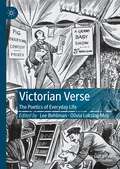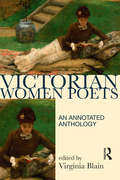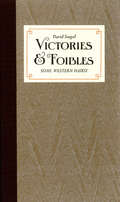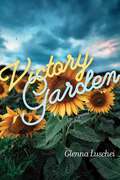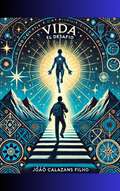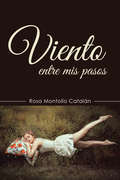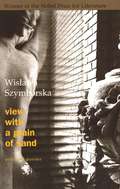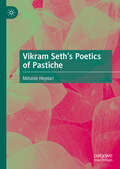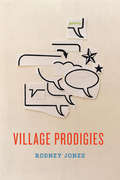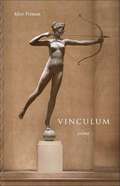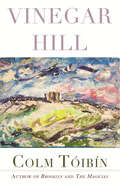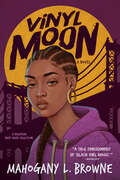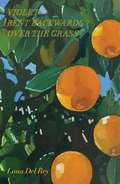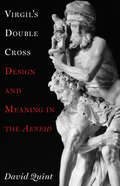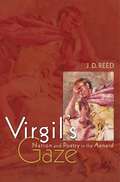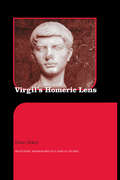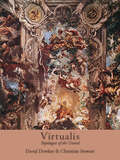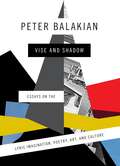- Table View
- List View
Victorian Sappho
by Yopie PrinsWhat is Sappho, except a name? Although the Greek archaic lyrics attributed to Sappho of Lesbos survive only in fragments, she has been invoked for many centuries as the original woman poet, singing at the origins of a Western lyric tradition. Victorian Sappho traces the emergence of this idealized feminine figure through reconstructions of the Sapphic fragments in late-nineteenth-century England. Yopie Prins argues that the Victorian period is a critical turning point in the history of Sappho's reception; what we now call "Sappho" is in many ways an artifact of Victorian poetics. Prins reads the Sapphic fragments in Greek alongside various English translations and imitations, considering a wide range of Victorian poets--male and female, famous and forgotten--who signed their poetry in the name of Sappho. By "declining" the name in each chapter, the book presents a theoretical argument about the Sapphic signature, as well as a historical account of its implications in Victorian England. Prins explores the relations between classical philology and Victorian poetics, the tropes of lesbian writing, the aesthetics of meter, and nineteenth-century personifications of the "Poetess." as current scholarship on Sappho and her afterlife. Offering a history and theory of lyric as a gendered literary form, the book is an exciting and original contribution to Victorian studies, classical studies, comparative literature, and women's studies.
Victorian Types, Victorian Shadows: Biblical Typology in Victorian Literature, Art and Thought (Routledge Revivals)
by George P. LandowThe importance of typology in the study of early modern literature has long been accepted, yet students of Victorian culture have paid little attention to it. First published in 1980, this study demonstrates how biblical typology, an apparently arcane interpretative mode, had profound effects on the secular culture of the Victorian age: its art, literature and thought. George Landow considers the way in which the average English believer learned to read their Bible in terms of the types and shadows of Christ, the various ways in which Victorian poetry and hymns employed certain imagery, and the use of typological symbolism in narrative poetry, prose fiction, dramatic monologue and non-fiction. In a concluding chapter, he investigates the particularly complex, and often ironic, combinations of typological image and typological structure.
Victorian Verse: The Poetics of Everyday Life
by Lee Behlman Olivia Loksing MoyVictorian Verse: The Poetics of Everyday Life casts new light on nineteenth-century poetry by examining the period through its popular verse forms and their surrounding social and media landscape. The volume offers insight into two central concepts of both the Victorian era and our own—status and taste—and how cultural hierarchies then and now were and are constructed and broken. By recovering the lost diversity of Victorian verse, the book maps the breadth of Victorian writing and reading practices, illustrating how these seemingly minor verse genres actually possessed crucial social functions for Victorians, particularly in education, leisure practices, the cultural production of class, and the formation of individual and communal identities. The essays consider how “major” Victorian poets, such as the Pre-Raphaelites, were also committed to writing and reading “minor” verse, further troubling the clear-cut notions of canonicity by examining the contradictions of value.
Victorian Women Poets: An Annotated Anthology (Longman Annotated Texts)
by Virginia BlainThere has been a huge revival of interest in Victorian women's poetry in the last ten years, and it has led to a major reconfiguration of the English poetic landscape of the nineteenth century. This title offers a key selection of poems by 13 Victorian women poets from Christina Rosetti and Felicia Hemans to the witty, iconoclastic May Kendall. The book starts with a substantial general Introduction which places the work of the poets into a context both historical (that of the poems' production) and modern (that of their past and present reception). Each poet's work is introduced by an expansive headnote which tells the story of her life and writing career. The poems all have full explanatory notes to help readers unfamiliar with the period. A Bibliography lists general sources as well as useful further readings. Written in an engaging and accessible manner, the extensive annotations throughout Victorian Women Poets ensure that this fascinating poetry is enjoyable for undergraduate and non-specialist readers.
Victories & Foibles: Some Western Haiku
by David SeegalThe following haiku verses, written in an American style, are departures from the exacting nature of this Japanese poem. <P><P>By relaxing the restraints upon subject and style, the American poet gains the opportunity to experiment with and to possibly enhance the classic European examples. Although Japanese savants differ about the precise poetics of haiku, they agree that these short poems, highly successful since the thirteenth century, should be composed of three lines, the first and last bearing five syllables and the second bearing seven syllables.Kyoto BuddhaHe of stone, I of flesh, yetIt is he who smilesthat make a book of rare appeal to the western reader.
Victory Garden: Poems (Mary Burritt Christiansen Poetry Series)
by Glenna LuscheiRooted in the Midwest but at home anywhere, Glenna Luschei has spent over fifty years writing and supporting other writers in the midst of adventures that have taken her around the globe. Now in her late eighties and as vibrant as ever, Luschei has crafted a collection that comprises a retrospective of her life: her youth during World War II; her adventures in New Mexico, Colombia, Cuba, and elsewhere; and her ongoing love affair with the arts. Luschei relives highs and lows through these poems and reminds readers to live life to the fullest as we never know if tomorrow will be our last day. Join Luschei as she embraces the gift of living and a life that is full of hope and love rather than regret in this reflective work.
Vida - El desafío
by João Calazans FilhoEl libro es una reflexión sobre las etapas que la vida nos impone. El autor siempre fiel a su pensamiento estableció como base, política, religión y diplomacia. Los poemas de Vida - El desafío, tras la reflexión diaria del cotidiano común, en el que de forma filosófica deja espacios para que cada lector sienta como si fuese parte del pensamiento. La Obra es parte de búsquedas individuales, desvelando el entendimiento de quiénes somos, como nos imaginamos y cómo nos gustaría ser. Esta es una aventura poética del autor, y durante la lectura, nos sentimos un poco de brujo y mágico, con amplios poderes para justificar la intención de comprender mejor al ser humano y transformarlos en seres mejores.
Viento entre mis pasos
by Rosa Montolío Catalán¿Sientes los sueños, el amor, la melancolía o las injusticias sociales? <P><P>Vuela entre estas páginas y descúbrelo. Viento entre mis pasos es un poemario joven, lleno de emociones y sensaciones que se perciben a través de los sueños, de la belleza de los colores, del romanticismo, del amor y del desamor que, a veces, nos hace volar a otros mundos alegres o tristes. <P><P>Como pájaros planeamos por el arcoíris, por los grandes mares, somos animales y hojas que en nuestras alas van dejando huellas. Pero, nuestros pies caminan y el viento los frena: se rebela, y bailan nuestros dedos balanceándonos en las ráfagas. <P><P>Rosa, invita al lector a sentir el viento sobre sus pasos, unas veces suave y soñador, y otras duro y cruel hasta alcanzar el dolor de la muerte.
View with a Grain of Sand
by Wislawa SzymborskaFrom one of Europe's most prominent and celebrated poets, a collection remarkable for its graceful lyricism. With acute irony tempered by a generous curiosity, Szymborska documents life's improbability as well as its transient beauty to capture the wonder of existence. Preface by Mark Strand. Translated by Stanislaw Baranczak and Clare Cavanagh, winners of the PEN Translation Prize.
Vikram Seth’s Poetics of Pastiche
by Mélanie HeydariVikram Seth is a critical enigma. He is recognized as one of the most important Indian Anglophone authors of his generation; his individual works have been widely reviewed, yet his work has rarely been approached as a whole and remains surprisingly understudied. Perhaps the chief reason for the paucity of critical response to the full compass of Seth’s work is his disregard for intellectual fashion. Indeed, Seth is at once very popular and deliberately unfashionable. His literary affiliations are conservative; seemingly uninterested in any revisionary narrative, he is equally unconcerned by the interpenetration of cultures in our globalized world, representing assimilation rather than cultural difference. He defies the expectations of both postcolonial and world literature; therefore, to discuss his critical neglect is to shed light on the limitations of these labels. As the most thorough attempt to map a general poetics in Seth’s work, this study – the first of its kind on this writer– develops a new critical methodology to capture the nuances of Seth’s literary strategies. It provides scholars and students insight into the key features of Seth’s work and uncovers a consistent authorial strategy running through his seemingly disconnected body of work, namely a systematic use of intertextual practices.
Village Prodigies
by Rodney Jones“A novel in language as dense and lush and beautiful as poetry . . . [or] a book of poetry with the vivid characters and the narrative force of a novel? Whatever you care to call it, it’s a remarkable achievement.” — Richard Russo, Pulitzer Prize–winning author of Empire Falls Village Prodigies imagines the town of Cold Springs, Alabama, from 1950 to 2015 and unfurls its narrative reach as six boys—prodigies and swains—grow up and leave the familiarity of home and the rural South. Yet all prodigies, all memories, all stories inevitably loop back. Through a multiplicity of points of view and innovative forms, Rodney Jones plays with the contradictions in our experience of time, creating portals through which we travel between moments and characters, from the interior mind to the most exterior speech, from delusions to rational thought. We experience Alzheimer’s and its effect on family, listen to family lore and read family Facebook posts, relive war, and revive half-forgotten folktales and video games. In this deep examination of personal and communal memory, Jones blurs the lines between analog and digital, poetry and prose.
Vinculum: Poems
by Alice FrimanAlice Friman's latest collection, Vinculum, roots for deep connections between people, nature, retrospection, and the inevitable biological destiny of the body. Friman's work branches out from the core poem, "The Mythological Cod," to form a trellis of revelations on religion, sex, humor, science, and history.Her poems embrace the painful uncertainty of existence and relationships with clear-cut precision. The defiance and directness of Vinculum is matched by its musicality, creating a rich but fragile weave of human attachment.
Vinegar Hill: Poems
by Colm TóibínFrom the New York Times best-selling author of Brooklyn, Colm Tóibín&’s first collection of poetry explores sexuality, religion, and belonging through a modern lens.Fans of Colm Tóibín&’s novels, including The Magician, The Master, and Nora Webster, will relish the opportunity to re-encounter Tóibín in verse. Vinegar Hill explores the liminal space between private experiences and public events as Tóibín examines a wide range of subjects—politics, queer love, reflections on literary and artistic greats, living through COVID, and facing mortality. The poems reflect a life well-traveled and well-lived; from growing up in the town of Enniscorthy, wandering the streets of Dublin, and crossing the bridges of Venice to visiting the White House, readers will travel through familiar locations and new destinations through Tóibín&’s unique lens.Within this rich collection of poems written over the course of several decades, shot through with keen observation, emotion, and humor, Tóibín offers us lines and verses to provoke, ponder, and cherish.
Vinyl Moon
by Mahogany L. BrowneA teen girl hiding the scars of a past relationship finds home and healing in the words of strong Black writers. A beautiful sophomore novel from a critically acclaimed author and poet that explores how words have the power to shape and uplift our world even in the midst of pain."A true embodiment of the term Black Girl Magic.&” –Booklist When Darius told Angel he loved her, she believed him. But five weeks after the incident, Angel finds herself in Brooklyn, far from her family, from him, and from the California life she has known. Angel feels out of sync with her new neighborhood. At school, she can&’t shake the feeling everyone knows what happened—and that it was her fault. The only place that makes sense is Ms. G&’s class. There, Angel&’s classmates share their own stories of pain, joy, and fortitude. And as Angel becomes immersed in her revolutionary literature course, the words from Black writers like Toni Morrison, James Baldwin, and Zora NEale Hurston speak to her and begin to heal the wounds of her past.This stunning novel weaves together prose, poems, and vignettes to tell the story of Angel, a young woman whose past was shaped by domestic violence but whose love of language and music and the gift of community grant her the chance to find herself again.
Violet Bent Backwards Over the Grass
by Lana Del ReyTHE HIGHLY ANTICIPATED DEBUT BOOK OF POETRY FROM LANA DEL REY, VIOLET BENT BACKWARDS OVER THE GRASS 'Violet Bent Backwards Over the Grass is the title poem of the book and the first poem I wrote of many. Some of which came to me in their entirety, which I dictated and then typed out, and some that I worked laboriously picking apart each word to make the perfect poem. They are eclectic and honest and not trying to be anything other than what they are and for that reason I&’m proud of them, especially because the spirit in which they were written was very authentic. Lana Del Rey Lana&’s breathtaking first book solidifies her further as 'the essential writer of her times' (The Atlantic). The collection features more than thirty poems, many exclusive to the book: Never to Heaven, The Land of 1,000 Fires, Past the Bushes Cypress Thriving, LA Who Am I to Love You?, Tessa DiPietro, Happy, Paradise Is Very Fragile, Bare Feet on Linoleum and many more. This beautiful hardcover edition showcases Lana&’s typewritten manuscript pages alongside her original photography. The result is an extraordinary poetic landscape that reflects the unguarded spirit of its creator. Violet Bent Backwards Over the Grass is also brought to life in an unprecedented spoken word audiobook which features Lana Del Rey reading fourteen select poems from the book accompanied by music from Grammy Award-winning musician Jack Antonoff.
Violet Bent Backwards Over the Grass
by Lana Del ReyTHE HIGHLY ANTICIPATED DEBUT BOOK OF POETRY FROM LANA DEL REY, VIOLET BENT BACKWARDS OVER THE GRASS &“Violet Bent Backwards Over the Grass is the title poem of the book and the first poem I wrote of many. Some of which came to me in their entirety, which I dictated and then typed out, and some that I worked laboriously picking apart each word to make the perfect poem. They are eclectic and honest and not trying to be anything other than what they are and for that reason I&’m proud of them, especially because the spirit in which they were written was very authentic.&”—Lana Del Rey Lana&’s breathtaking first book solidifies her further as &“the essential writer of her times&” (The Atlantic). The collection features more than thirty poems, many exclusive to the book: Never to Heaven, The Land of 1,000 Fires, Past the Bushes Cypress Thriving, LA Who Am I to Love You?, Tessa DiPietro, Happy, Paradise Is Very Fragile, Bare Feet on Linoleum, and many more. This beautiful hardcover edition showcases Lana&’s typewritten manuscript pages alongside her original photography. The result is an extraordinary poetic landscape that reflects the unguarded spirit of its creator. Violet Bent Backwards Over the Grass is also brought to life in an unprecedented spoken word audiobook which features Lana Del Rey reading fourteen select poems from the book accompanied by music from Grammy Award-winning musician Jack Antonoff.
Violet Bent Backwards Over the Grass
by Lana Del ReyThe New York Times bestselling debut book of poetry from Lana Del Rey, Violet Bent Backwards Over the Grass.&“Violet Bent Backwards Over the Grass is the title poem of the book and the first poem I wrote of many. Some of which came to me in their entirety, which I dictated and then typed out, and some that I worked laboriously picking apart each word to make the perfect poem. They are eclectic and honest and not trying to be anything other than what they are and for that reason I&’m proud of them, especially because the spirit in which they were written was very authentic.&” —Lana Del Rey Lana&’s breathtaking first book solidifies her further as &“the essential writer of her times&” (The Atlantic). The collection features more than thirty poems, many exclusive to the book: Never to Heaven, The Land of 1,000 Fires, Past the Bushes Cypress Thriving, LA Who Am I to Love You?, Tessa DiPietro, Happy, Paradise Is Very Fragile, Bare Feet on Linoleum, and many more. This beautiful hardcover edition showcases Lana&’s typewritten manuscript pages alongside her original photography. The result is an extraordinary poetic landscape that reflects the unguarded spirit of its creator. Violet Bent Backwards Over the Grass is also brought to life in an unprecedented spoken word audiobook which features Lana Del Rey reading fourteen select poems from the book accompanied by music from Grammy Award–winning musician Jack Antonoff.
Violets: A Collection Of Inspirational Poems By The Women Of Delta Sigma Theta Sorority Incorporated
by Shahari MooreViolets is a collection of poems by the women of Delta Sigma Theta Sorority Incorporated, the largest African American Sorority in the world. The 22 contributing poets bring range, color, complexity and inspiration to the page.
Virgil in the Renaissance
by David Scott Wilson-OkamuraThe disciplines of classical scholarship were established in their modern form between 1300 and 1600, and Virgil was a test case for many of them. What became of Virgil in this period - how he was understood and how his poems were recycled - is an example of something that occurs to every classic when it outlives it original context: the words remain but their meaning becomes unsponsored. What did readers assume about Virgil in the long decades between Dante and Sidney, Petrarch and Spenser, Boccaccio and Ariosto? Which commentators had the most influence? What story, if any, was Virgil's Eclogues supposed to tell? What was the status of his Georgics? Which parts of his epic attracted the most imitators? Building on specialized scholarship of the last hundred years, this book provides a panoramic synthesis of what scholars and poets from across Europe believed they could know about Virgil's life and poetry.
Virgil's Double Cross: Design and Meaning in the Aeneid
by David QuintThe message of Virgil's Aeneid once seemed straightforward enough: the epic poem returned to Aeneas and the mythical beginnings of Rome in order to celebrate the city's present world power and to praise its new master, Augustus Caesar. Things changed when late twentieth-century readers saw the ancient poem expressing their own misgivings about empire and one-man rule. In this timely book, David Quint depicts a Virgil who consciously builds contradiction into the Aeneid. The literary trope of chiasmus, reversing and collapsing distinctions, returns as an organizing signature in Virgil's writing: a double cross for the reader inside the Aeneid's story of nation, empire, and Caesarism. Uncovering verbal designs and allusions, layers of artfulness and connections to Roman history, Quint's accessible readings of the poem's famous episodes--the fall of Troy, the story of Dido, the trip to the Underworld, and the troubling killing of Turnus—disclose unsustainable distinctions between foreign war/civil war, Greek/Roman, enemy/lover, nature/culture, and victor/victim. The poem's form, Quint shows, imparts meanings it will not say directly. The Aeneid's life-and-death issues—about how power represents itself in grand narratives, about the experience of the defeated and displaced, and about the ironies and revenges of history—resonate deeply in the twenty-first century.This new account of Virgil's masterpiece reveals how the Aeneid conveys an ambivalence and complexity that speak to past and present.
Virgil's Gaze: Nation and Poetry in the Aeneid
by J. D. ReedVirgil's Aeneid invites its reader to identify with the Roman nation whose origins and destiny it celebrates. But, as J. D. Reed argues in Virgil's Gaze, the great Roman epic satisfies this identification only indirectly--if at all. In retelling the story of Aeneas' foundational journey from Troy to Italy, Virgil defines Roman national identity only provisionally, through oppositions to other ethnic identities--especially Trojan, Carthaginian, Italian, and Greek--oppositions that shift with the shifting perspective of the narrative. Roman identity emerges as multivalent and constantly changing rather than unitary and stable. The Roman self that the poem gives us is capacious--adaptable to a universal nationality, potentially an imperial force--but empty at its heart. However, the incongruities that produce this emptiness are also what make the Aeneid endlessly readable, since they forestall a single perspective and a single notion of the Roman. Focusing on questions of narratology, intertextuality, and ideology, Virgil's Gaze offers new readings of such major episodes as the fall of Troy, the pageant of heroes in the underworld, the death of Turnus, and the disconcertingly sensual descriptions of the slain Euryalus, Pallas, and Camilla. While advancing a highly original argument, Reed's wide-ranging study also serves as an ideal introduction to the poetics and principal themes of the Aeneid.
Virgil's Homeric Lens (Routledge Monographs in Classical Studies)
by Edan DekelVirgil’s Homeric Lens reevaluates the traditional view of the Aeneid’s relationship to Homer’s Iliad and Odyssey. Almost since the death of Virgil, there has been an assumption that the Aeneid breaks into two discrete halves: Virgil’s Odyssey, and Virgil’s Iliad. Although modified in various ways over the centuries, this neat dichotomy has generally diminished the complexity and resonance of the connection between the two canonical epic poets. This work offers an alternate approach in which Virgil uses the transformative power of the Odyssey as a precise filter through which to read the Iliadic experience. By examining the ways in which Virgil bases his own epic project on the dynamic interaction between the two Homeric poems themselves, Edan Dekel proposes a system in which the Aeneid uses the Odyssey both as a conceptual model for writing an intertextual epic and as a powerful refracting lens for the specific interpretation of the Iliad and its consequences. The traditional view of the Homeric poems as static sources for the construction of distinct "Odyssean" and "Iliadic" halves of the Aeneid is supplanted by an analysis which emphasizes the active and persistent influence of the Odyssey as a guide to processing the major thematic concerns of the Iliad and exploring the multiple aftermaths of the Trojan war.
Virgil’s Eclogues and the Art of Fiction
by Raymond KaniaMany scholars have seen ancient bucolic poetry as a venue for thinking about texts and textuality. This book reassesses Virgil's Eclogues and their genre, arguing that they are better read as fiction - that is, as a work that refers not merely to itself or to other texts but to a world of its own making. This makes for a rich work of art and an object of legitimate aesthetic and imaginative engagement. Increased attention to the fictionality of Virgilian poetry also complicates and enriches the Eclogues' social and political dimensions. The book offers new interpretations of poems like Eclogues 5 and 9, which, according to traditional allegorical readings, concern Julius Caesar and the confiscation of lands under Octavian, respectively. It shows how the Eclogue world stands in a less stable relation to reality; these poems challenge readers at every turn to reimagine the relationship between fiction and the real.
Virtualis: Topologies of the Unreal
by David Dowker Christine StewartVirtualis: Topologies of the Unreal is a poetic investigation of melancholia and the baroque. As a collaborative reading of writers such as Walter Benjamin, Christine Buci-Glucksmann, Giorgio Agamben, Gilles Deleuze, Charles Baudelaire and Arthur Rimbaud, David Dowker and Christine Stewart have created a series of linguistic interjections that run from the allegorical barricades of the baroque to the topological confound of the modern, incorporating (for example) Medusa and the Sphinx, aestivating snails and the alchemy of bees. Lush and extravagant, this is writing tuned in to the terrestrial spectacle.
Vise and Shadow: Essays on the Lyric Imagination, Poetry, Art, and Culture
by Peter BalakianPeter Balakian is a renowned poet, scholar, and memoirist; but his work as an essayist often prefigures and illuminates all three. "I think of vise and shadow as two dimensions of the lyric (literary and visual) imagination," he writes in the preface to this collection, which brings together essayistic writings produced over the course of twenty-five years. Vise, "as in grabbing and holding with pressure," but also in the sense of the vise-grip of the imagination, which can yield both clarity and knowledge. Consider the vise-grip of some of the poems of our best lyric poets, how language might be put under pressure "as carbon might be put under pressure to create a diamond. " And shadow, the second half of the title: both as noun, "the shaded or darker portion of the picture or view or perspective," "partial illumination and partial darkness"; and as verb, to shadow, "to trail secretly as an inseparable companion" or a "force that follows something with fidelity; to cast a dark light on something--a person, an event, an object, a form in nature. " Vise and Shadow draws into conversation such disparate figures as W. B. Yeats, Hart Crane, Joan Didion, Primo Levi, Robert Rauschenberg, Bob Dylan, Elia Kazan, and Arshile Gorky, revealing how the lyric imagination of these artists grips experience, "shadows history," and "casts its own type of illumination," creating one of the deepest kinds of human knowledge and sober truth. In these elegantly written essays, Balakian offers a fresh way to think about the power of poetry, art, and the lyrical imagination as well as history, trauma, and memory.
